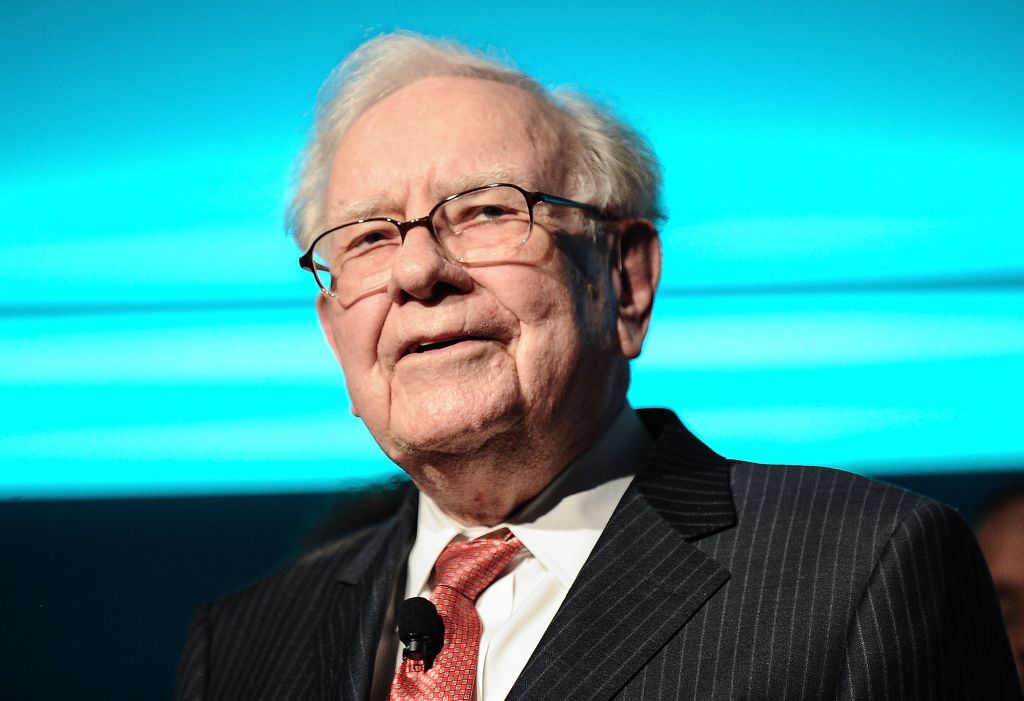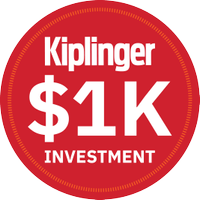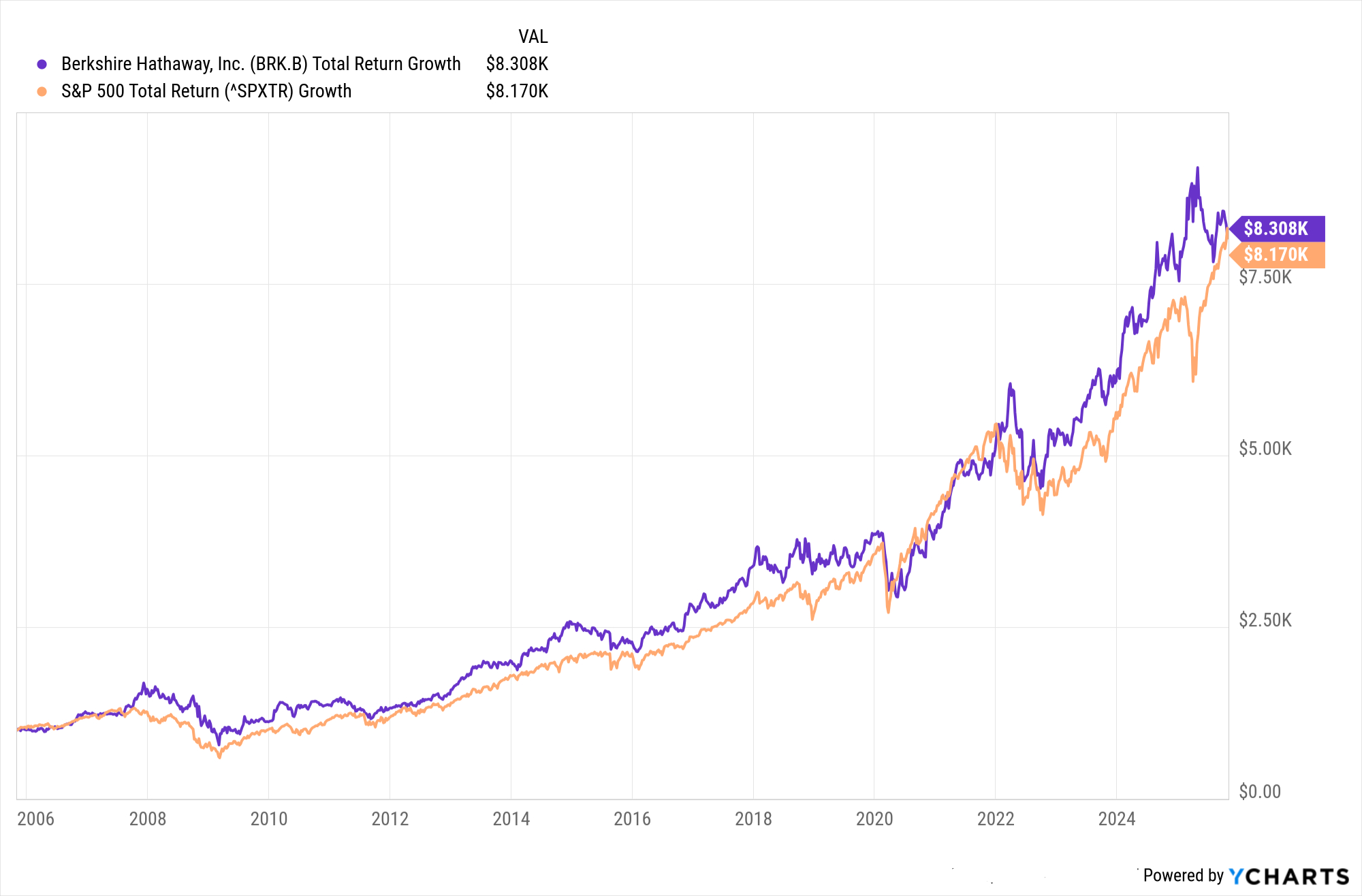If You'd Put $1,000 Into Berkshire Hathaway Stock 20 Years Ago, Here's What You'd Have Today
Berkshire Hathaway is a long-time market beater, but the easy money in BRK.B has already been made.



Profit and prosper with the best of Kiplinger's advice on investing, taxes, retirement, personal finance and much more. Delivered daily. Enter your email in the box and click Sign Me Up.
You are now subscribed
Your newsletter sign-up was successful
Want to add more newsletters?

Delivered daily
Kiplinger Today
Profit and prosper with the best of Kiplinger's advice on investing, taxes, retirement, personal finance and much more delivered daily. Smart money moves start here.

Sent five days a week
Kiplinger A Step Ahead
Get practical help to make better financial decisions in your everyday life, from spending to savings on top deals.

Delivered daily
Kiplinger Closing Bell
Get today's biggest financial and investing headlines delivered to your inbox every day the U.S. stock market is open.

Sent twice a week
Kiplinger Adviser Intel
Financial pros across the country share best practices and fresh tactics to preserve and grow your wealth.

Delivered weekly
Kiplinger Tax Tips
Trim your federal and state tax bills with practical tax-planning and tax-cutting strategies.

Sent twice a week
Kiplinger Retirement Tips
Your twice-a-week guide to planning and enjoying a financially secure and richly rewarding retirement

Sent bimonthly.
Kiplinger Adviser Angle
Insights for advisers, wealth managers and other financial professionals.

Sent twice a week
Kiplinger Investing Weekly
Your twice-a-week roundup of promising stocks, funds, companies and industries you should consider, ones you should avoid, and why.

Sent weekly for six weeks
Kiplinger Invest for Retirement
Your step-by-step six-part series on how to invest for retirement, from devising a successful strategy to exactly which investments to choose.
Berkshire Hathaway (BRK.B) is in a class by itself when it comes to really long-term outperformance. It's not for nothing that Warren Buffett, who will retire as CEO at the end of 2025, is known as the greatest long-term investor of all time.
BRK.B stock has been a market beater over the past 20 years, too, but all the millionaires Berkshire minted had skin in the game long before the turn of the century.
That's how compounding and the law of large numbers work.
From just $107.88 $24.99 for Kiplinger Personal Finance
Become a smarter, better informed investor. Subscribe from just $107.88 $24.99, plus get up to 4 Special Issues

Sign up for Kiplinger’s Free Newsletters
Profit and prosper with the best of expert advice on investing, taxes, retirement, personal finance and more - straight to your e-mail.
Profit and prosper with the best of expert advice - straight to your e-mail.
But first, a quick recap of Berkshire Hathaway's history. The company was a struggling textile firm when Buffett took control in 1965. Over the ensuing years, Buffett converted it into a holding company, or a company that buys other companies.
Buffett's first target was an insurance company, and the insurance business continues to be at the core of Berkshire's operations today.
Insurance was especially attractive to Buffett because of float, or the money insurance companies hold between collecting premiums and paying out claims. Thanks to the float from Berkshire's insurance companies, Buffett had ample sources of capital to buy up or invest in other enterprises.
Today, Berkshire Hathaway comprises more than 60 wholly owned subsidiaries, including BNSF Railway, Geico insurance, industrial titan Precision Castparts and fast food chain Dairy Queen.
Meanwhile, the Berkshire Hathaway equity portfolio, with a market value of about $250 billion, includes major stakes in Apple (AAPL), Bank of America (BAC) and American Express (AXP), to name just a few.
Berkshire Hathaway has always been a long-term bet on the dynamism of the U.S. economy. It's also a low-beta stock, which means it tends to underperform in up markets and outperform in down markets.
And what that has added up to over the past 60 years is nothing less than astonishing. Since 1965, Berkshire stock has generated a compound annual growth rate of almost 20% vs 10% for the S&P 500.
What does that look like on a brokerage statement? Well, if you put $1,000 into Berkshire stock 60 years ago, it would be worth about $33 million today. The same sum invested in the S&P 500 would today be worth about $336,000.
Warren Buffett and his late partner Charlie Munger really did mint many a millionaire over the course of their long careers.
However, BRK.B's returns over the past 20 years, while good, have naturally been more modest.
After all, there's nothing like getting in on the ground floor.
The bottom line on Berkshire stock?

Although BRK.B stock outperformed the broader market by a wide margin over the past five years, it actually lagged the returns of the S&P 500 over the past one-, three-, 10- and 15-year periods.
If you go back 20 years, BRK.B, which doesn't pay a dividend, generated an annualized return of 11.2%.
That's not too shabby, but it leads the S&P 500, with dividends reinvested, by less than a percentage point. An active fund manager might be happy with such results, but it hardly means BRK.B stock was a path to riches in the 21st century.
Have a look at the above chart to get a sense of what BRK.B's returns would mean to your brokerage statement over the past couple of decades. They're just OK.
Indeed, if you put $1,000 into Berkshire stock 20 years ago, today it would be worth about $8,300. The same amount invested in the S&P 500 would theoretically be worth about $8,200 today.
With Warren Buffett set to step down at the end of 2025, some folks fear that Berkshire stock's best days are behind it. The reality is that Berkshire is now so big that it's unreasonable to expect anyone to repeat Buffett's historic run.
True, that doesn't mean BRK.B can't continue to be a market beater going forward. Wall Street is mostly bullish on the name, giving it a consensus recommendation of Buy, according to data from S&P Global Market Intelligence.
Nevertheless, BRK.B's era of generating truly outstanding returns would appear to be behind it – and that was true even before Buffett announced his retirement.
More Stocks of the Past 20 Years
- If You'd Put $1,000 Into Amazon Stock 20 Years Ago, Here's What You'd Have Today
- If You'd Put $1,000 Into Microsoft Stock 20 Years Ago, Here's What You'd Have Today
- If You'd Put $1,000 Into Netflix Stock 20 Years Ago, Here's What You'd Have Today
Profit and prosper with the best of Kiplinger's advice on investing, taxes, retirement, personal finance and much more. Delivered daily. Enter your email in the box and click Sign Me Up.

Dan Burrows is Kiplinger's senior investing writer, having joined the publication full time in 2016.
A long-time financial journalist, Dan is a veteran of MarketWatch, CBS MoneyWatch, SmartMoney, InvestorPlace, DailyFinance and other tier 1 national publications. He has written for The Wall Street Journal, Bloomberg and Consumer Reports and his stories have appeared in the New York Daily News, the San Jose Mercury News and Investor's Business Daily, among many other outlets. As a senior writer at AOL's DailyFinance, Dan reported market news from the floor of the New York Stock Exchange.
Once upon a time – before his days as a financial reporter and assistant financial editor at legendary fashion trade paper Women's Wear Daily – Dan worked for Spy magazine, scribbled away at Time Inc. and contributed to Maxim magazine back when lad mags were a thing. He's also written for Esquire magazine's Dubious Achievements Awards.
In his current role at Kiplinger, Dan writes about markets and macroeconomics.
Dan holds a bachelor's degree from Oberlin College and a master's degree from Columbia University.
Disclosure: Dan does not trade individual stocks or securities. He is eternally long the U.S equity market, primarily through tax-advantaged accounts.
-
 Quiz: Do You Know How to Avoid the "Medigap Trap?"
Quiz: Do You Know How to Avoid the "Medigap Trap?"Quiz Test your basic knowledge of the "Medigap Trap" in our quick quiz.
-
 5 Top Tax-Efficient Mutual Funds for Smarter Investing
5 Top Tax-Efficient Mutual Funds for Smarter InvestingMutual funds are many things, but "tax-friendly" usually isn't one of them. These are the exceptions.
-
 AI Sparks Existential Crisis for Software Stocks
AI Sparks Existential Crisis for Software StocksThe Kiplinger Letter Fears that SaaS subscription software could be rendered obsolete by artificial intelligence make investors jittery.
-
 5 Top Tax-Efficient Mutual Funds for Smarter Investing
5 Top Tax-Efficient Mutual Funds for Smarter InvestingMutual funds are many things, but "tax-friendly" usually isn't one of them. These are the exceptions.
-
 Why Invest In Mutual Funds When ETFs Exist?
Why Invest In Mutual Funds When ETFs Exist?Exchange-traded funds are cheaper, more tax-efficient and more flexible. But don't put mutual funds out to pasture quite yet.
-
 Social Security Break-Even Math Is Helpful, But Don't Let It Dictate When You'll File
Social Security Break-Even Math Is Helpful, But Don't Let It Dictate When You'll FileYour Social Security break-even age tells you how long you'd need to live for delaying to pay off, but shouldn't be the sole basis for deciding when to claim.
-
 I'm an Opportunity Zone Pro: This Is How to Deliver Roth-Like Tax-Free Growth (Without Contribution Limits)
I'm an Opportunity Zone Pro: This Is How to Deliver Roth-Like Tax-Free Growth (Without Contribution Limits)Investors who combine Roth IRAs, the gold standard of tax-free savings, with qualified opportunity funds could enjoy decades of tax-free growth.
-
 One of the Most Powerful Wealth-Building Moves a Woman Can Make: A Midcareer Pivot
One of the Most Powerful Wealth-Building Moves a Woman Can Make: A Midcareer PivotIf it feels like you can't sustain what you're doing for the next 20 years, it's time for an honest look at what's draining you and what energizes you.
-
 Stocks Make More Big Up and Down Moves: Stock Market Today
Stocks Make More Big Up and Down Moves: Stock Market TodayThe impact of revolutionary technology has replaced world-changing trade policy as the major variable for markets, with mixed results for sectors and stocks.
-
 I'm a Wealth Adviser Obsessed With Mahjong: Here Are 8 Ways It Can Teach Us How to Manage Our Money
I'm a Wealth Adviser Obsessed With Mahjong: Here Are 8 Ways It Can Teach Us How to Manage Our MoneyThis increasingly popular Chinese game can teach us not only how to help manage our money but also how important it is to connect with other people.
-
 Looking for a Financial Book That Won't Put Your Young Adult to Sleep? This One Makes 'Cents'
Looking for a Financial Book That Won't Put Your Young Adult to Sleep? This One Makes 'Cents'"Wealth Your Way" by Cosmo DeStefano offers a highly accessible guide for young adults and their parents on building wealth through simple, consistent habits.